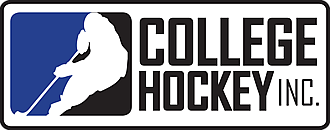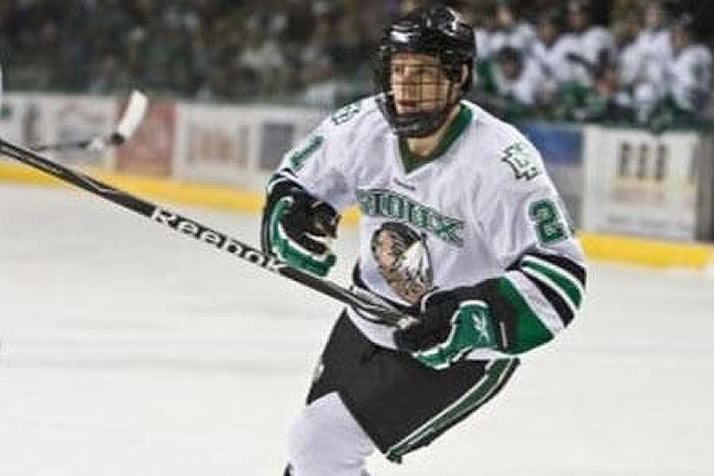


By Jared Shafran, College Hockey, Inc.
Despite the lure of major junior hockey in Canada, there are many natives of the north who are happy they came to the states for their education both on and off the ice. North Dakota senior forward Matt Frattin, who hails from Edmonton, Alberta, said he really wanted to take care of his education while playing hockey. "When you're playing major juniors, you're just playing strictly hockey which is not a bad thing but it's not a good thing at the same time," Frattin said. "Coming to college, you take care of your education while you're playing hockey. I think that's definitely something my parents and I thought I needed to do."
In his senior season, Frattin is one of the nation's leaders in scoring, having already amassed 20 goals and notched another 10 assists. Frattin also said he's had good experiences in the classroom during his time at school. "You kind of get a background of what's going on in the real world, which is good to have," Frattin said. "For my major I have to do an internship, 12 weeks in your field of work, so that's good experience. It prepares you if something doesn't work out with hockey, you can fall back on it and jump into the work field."
With the storied program the Fighting Sioux have, Frattin said he couldn't be happier with the school he chose. "Everybody just lives and dies hockey here in North Dakota and with the players that they've developed in the past, there's no better place to work on your game and learn tobe a professional when you come to the rink," Frattin said. "Every game we're selling out with just under 12,000 fans and students and it's a great atmosphere and community to be involved in."
Another example of a senior who has made the most of his time in college is Cory Conacher of Canisius. Conacher, who has 14 goals this season to lead the team, has had a bit of a bumpy ride along the way but said that he gets a lot of his motivation from the Canisius coaching staff. "The coach gave me a great opportunity here in college as a freshman," Conacher said. "Unfortunately in my first official practice I broke my wrist and missed the first 20 games of my college career. After that, coach gave me the opportunity to play on one of the top two lines and even on the power play my freshman year. That motivated me to work even harder in practice and in the gym."
Conacher finished his freshman season with 17 points in only 20 games. Since then, Conacher and Canisius have gotten better every year. Originally from Burlington, Ontario, he said he has no regrets about the decision to go to college. "Getting an education is very important," said Conacher. "You've got to think in the long run if your hockey career ends earlier than expected you want to have a backup plan and a good education is what will help you live your life and support your family."
Conacher also had some advice for younger players who may be looking to play hockey in college. "To those kids who are looking into going to college and play college hockey, you've got to make sure you keep your grades up in high school and it's important to work as hard on the ice as you do in the classroom. It's almost like a full job, you've got to take care of your grades in school and then come to the ice and be mentally in the hockey zone when you're at the rink and in the school zone when you're at the library.
One of the younger players in the college ranks who made the decision to go to school in the United States is Jamie Oleksiak, a freshman defenseman at Northeastern. After his brother played at Clarkson, Oleksiak said that opened the door for him to play in the States as well. "Being from Toronto, college hockey doesn't get a lot of exposure up north," Oleksiak said. "My dad was born and raised in Buffalo so he also knew about the NCAA and college hockey, and I figured that would give me more time to develop as a player."
Oleksiak, who recently turned 18 and was invited to train with the U.S. World Junior team, said he chose Northeastern because he liked the school's recent development and felt that the coaching staff would help him to succeed. "I've learned a lot from [head] coach Cronin and the rest of the coaching staff and I think I've developed leaps and bounds as a player," Oleksiak said. "It's been fantastic so far, I have no complaints, and I can't say enough about the program, I have no regrets."
So far this season, Oleksiak has started on defense in every game the Huskies have played, earning a +10 rating, which leads the team. "I wanted to live in a big city, and Boston is a huge college town," Oleksiak said. "It's a great atmosphere with great fans, it's always lively, and there's always something to do. It's a great city to be a part of, a blue collar city where you've got to work for everything and it's been a great experience for me being on my own up here, gaining some independence and learning some responsibility."
This month Oleksiak was ranked #27 in the North America Mid-Term Central Scouting and should have a bright future ahead of him in hockey but he also said his education was important to him. "Unfortunately hockey's not going to be there forever so it's kind of nice to get a degree and to have a plan after."
Across the river from Oleksiak at Northeastern is Cambridge, home to the Harvard Crimson and their star defenseman Danny Biega. Biega has had a unique experience in that he's had the opportunity to play with both of his brothers, Alex and Michael at school.
This year, as a sophomore, Danny is third on the team with 12 points. He said playing with both of his brothers was something he had never done before. "Growing up I didn't have the opportunity to play with both," Biega said. "Mike and Alex had always played together in youth hockey but I was always two years or one year behind and never had that chance so coming in as a freshman, playing with both of them was extremely fun."
Biega, a Montreal native, said he too had the option of playing elsewhere in Canada after he finished prep school at Salisbury, but decided to follow in the footsteps of his older brothers. "Going the academic route as opposed to the junior route, I feel like it makes you a more well rounded person," Biega said. "You get a different perspective not only of sports life but just an array of so many different things, so many different opportunities, and other things that you may encounter in life, which you may not realize from always being concentrated on hockey all the time."
Biega said when making his decision on where to play, he tried to think about how it would impact his life down the road, not just in the short term. "It's important to look how it's going to impact your life 20 years from now, 30 years from now, and really take in the larger picture of the rest of your life," Biega said.
The two options of playing either NCAA hockey or major junior will always be there for elite players from Canada, but these four guys are examples of players who have taken their game to the collegiate ranks and succeeded, with no regrets about their decision.